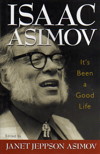As one of the most gifted and prolific writers of the twentieth century, Isaac Asimov has become a literary legend. In reflecting on his years and career in the last volume of his autobiographical trilogy, he said modestly, “It’s been a good life.”
Now ten years after her husband’s death, Janet Jeppson Asimov has carefully mined the depths of Asimov’s most personal thoughts about his life and work. She lovingly combines these with revealing excerpts from his letters to create an intimate portrait of a genius whose tireless passion for writing is evident on every page.
Throughout the book, Asimov shares his most important experiences: his years as a child prodigy in Depression-era Brooklyn, his early fascination with science fiction-fiction pulp magazines, the thrill of his first published story, the creation of his well-known story “Nightfall,” the genesis of the Foundation and robot series, and how he evolved as a creative writer. Significant moments throughout his life are described with Asimov’s characteristic wit, sense of humor, and ever-present optimism.
It’s Been a Good Life envelops the reader with the warmth and wisdom of Asimov’s unique style as though engaged in an exclusive conversation with the author. Beyond offering a compelling chronology of the events in the author’s life, many chapters highlight subjects and ideas that were particularly important to him: religion and the Bible, Shakespeare, and humanism, to name a few. Featured in this volume are “The Last Question,” which Asimov admitted to being his favorite story; his 400th essay on his thoughts about science; and several never-before-published photos. In the revised epilogue, written by Janet, she reveals the true story of Isaac’s final illness and death.
Isaac Asimov revolutionized what it means to be a writer. He created superbly enlightening science and history books about the world around him and wonderful science fiction worlds where his readers could lose themselves for hours. No other twentieth-century writer wrote with such Shakespearean eloquence or had more of a literary impact than Isaac Asimov. Simply put, It’s Been a Good Life is a behind-the-scenes look at genius and a must-have for Asimov fans as well as science and science-fiction fans in general.
In a sense, this book can be seen as an abridged version of I. Asimov: A Memoir with a dash of Yours, Isaac Asimov thrown in as leavening. It follows the some basic structure as I. Asimov: A Memoir, consisting of 38 sections on various topics related to Asimov’s life or thought. The biographical sections are more-or-less chronological. The text consists mostly of selections from Asimov’s autobiographies, but there are also quotes from Asimov’s correspondence interspersed. (One lifetime, when I’m truly ambitious, I’ll track down the source of the quotes.)
The book ends with an epilogue by Janet and three appendicies: Asimov’s final F&SF essay (stitched together by Janet from “our discussions and letters”), the complete text of Asimov’s favorite short story (“The Last Question”), and the list of books published in I. Asimov: A Memoir (unupdated). The third is something of a surprise—not that it’s there, but that it’s a reproduction of the earlier, incomplete list. Of course, the earlier list is problematic for the same reason—anyone who followed Asimov’s lists of his books closely would have been aware that quite a few books are missing.
The fact that the book is excerpts from Asimov’s writings means that it has a certain choppy feel. That’s inevitable, of course, but it’s enough to cut one spaceship-and-sun from the rating for the intended audience.
The rating for the Asimov fan would have similarly suffered—after all, there’s nothing really new in the body of the book—were it not for the epilogue and first appendix. Nine years brought a certain amount of healing to Janet, and the world’s attitudes on AIDS and AIDS patients had changed between 1992 and 2001. Janet was therefore able to chronicle in a more straightforward way the illnesses which dominated 1989 through 1992, and the epilogue where she does so is painful but needed. The official four hundredth F&SF essay is also very welcome, even if it wasn’t written per se by the Good Doctor himself.
And, of course, It’s Been a Good Life has one major advantage over Asimov’s other autobiographies: it’s a lot shorter. I myself have never resented the greater length of the others, of course, but someone pressed for time might prefer a light lunch to a full three-course dinner.
Contents
 |
“The Last Question” |

